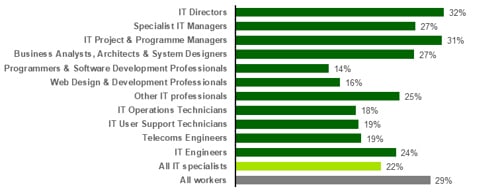Nature of employment
Occupation
Representation of older workers amongst the IT professions varies substantially and during 2022, whilst only around one in seven programmers/developers (14%) were aged 50+, almost one third of those working as IT Directors (32%) were from this age bracket.
Indeed - in general, it would appear that in general older workers are most poorly represented amongst IT development (web/other) and best represented amongst senior/managerial and technical positions.
Representation by IT occupation (2022)

Source: Analysis of ONS Quarterly Labour Force Survey by BCS
Permanency of employment
At 2%, the proportion of IT specialists aged 50 and above that were working on a non-permanent basis during 2022 was marginally below that of younger IT specialists (3%), and individuals as a whole aged 50+ (4%).
By comparison, the incidence of non-permanent employment amongst all workers during 2022, was higher at 6%.
Though a detailed analysis of the reasons why IT specialists (older/otherwise) were in non-permanent employment during 2022 is not possible (due to limitations of the data source), it can be said that older IT specialists appear more likely to be in temporary positions as they do not want a permanent job (35% of those aged 50 or above stating this to be the case during the 2018-22 period compared with 20% of those aged 16-49) and this was also the case for workers of this age as a whole (with a comparison figures of 34% and 23% respectively).
Age and unemployment
There were approximately 12,000 unemployed IT specialists aged 50 and above in the UK during 2022 – 38% of all unemployed IT specialists in the UK at that time.
At 2.8% the associated unemployment rate[1] for IT specialists aged 50 and more than double that for younger age groups (1.3%) but below that for ‘older’ workers as a whole (2.7%).
[1]See data notes.













